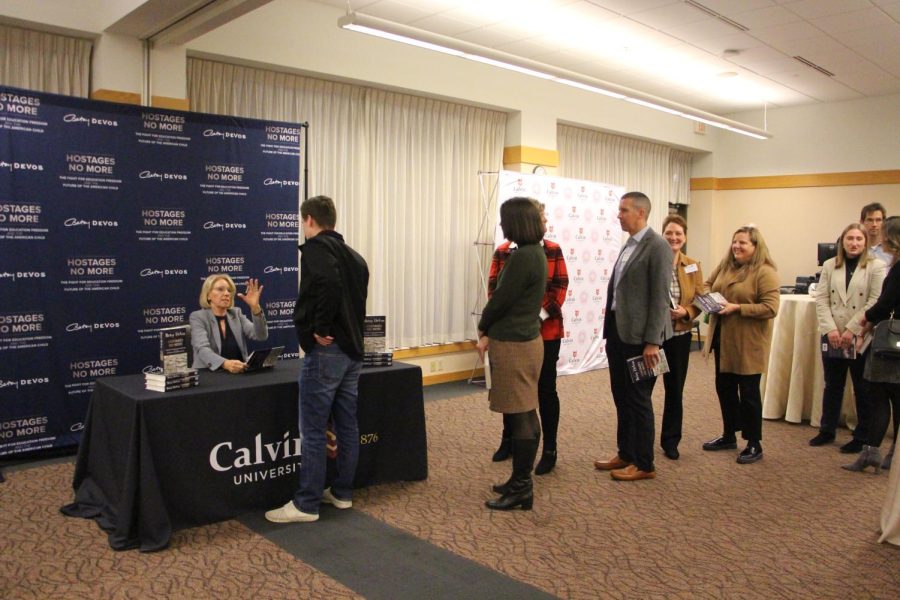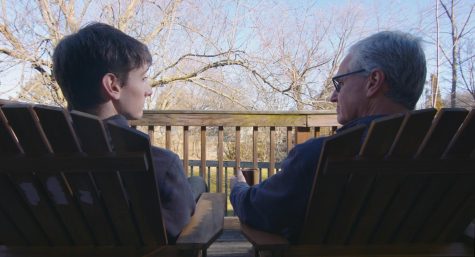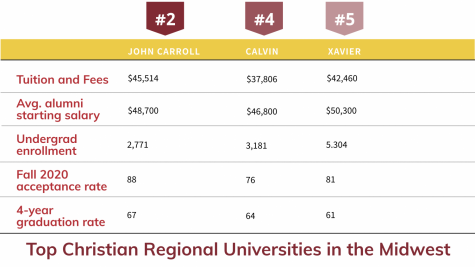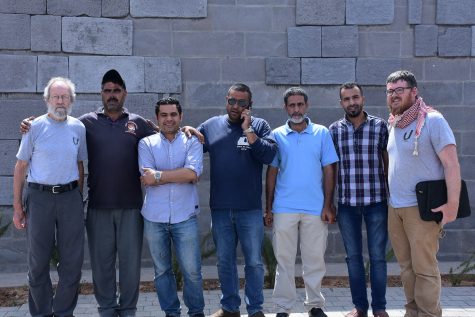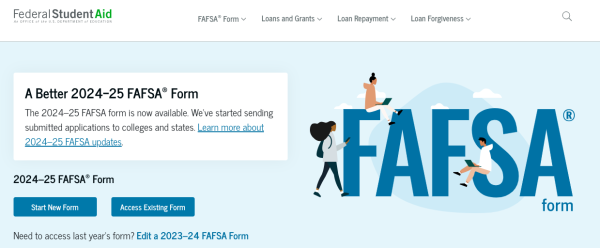“Misperception and misconceptions”: A Q&A with Betsy DeVos
DeVos signed copies of her most recent book for Calvin community members at the Prince Conference Center on Nov. 17.
This conversation has been edited for length and clarity.
Chimes: I’m hoping we could start by thinking back to your time at Calvin.
DeVos: I never considered going anywhere else besides Calvin. It was not a time where anybody ever even suggested considering something different. I might have actually considered somewhere else if I had been given permission … to think about that. But I knew I wanted to go away from Holland, not go to Hope College, because that was my backyard, basically.
I came [to Calvin] with the desire to become an interior designer. And to do that, I would go to Calvin for two years, and then transfer for two years to Kendall College of Art and Design. And I met with the art department advisor at the time … and he very emphatically told me that that was a really bad idea. And I was very impressionable. I was a young student, I started when I was 17. I didn’t push back or really argue, and that kind of prompted me to change my major to business and political science.
Chimes: You’re a bit of a divisive figure here in West Michigan and at Calvin specifically. Could you talk a little about what it’s like coming back here, and how you navigate your relationship with this area, and with Calvin?
DeVos: So first of all, President Boer has been very welcoming and very insistent that I come. And I am grateful for that, because that really didn’t happen before; I was not invited here while I was in office or right after. I think it would have been useful to actually have a couple of forums [at that time] where I talked about the things that I’m really advocating — I think there’s so much misperception and misconceptions about the policies that I have long promoted, and if people don’t sort of get below that surface, immediate, reflexive, opinion or reaction, they never get to the heart of the matter. And I think it’s important for people to actually dive a little deeper and dig a little more to better understand the policies and what the rationale is behind them.
Chimes: In mid-November, Trump announced that he’s planning to run again. As someone who served in his administration but ultimately resigned after Jan. 6, do you see yourself supporting his candidacy or being willing to work with him again?
DeVos: I think the policies that he stood for and promoted are, on balance, the ones that we should be embracing. And they actually worked; we had a growing economy and we had a border that was secure. We had someone who actually supported and promoted the idea that parents should make the choices for their kids’ schools and education. And so many of the good things that we accomplished during his administration are being turned back by the current administration. And I think that’s unfortunate, because it’s the people who can least afford to have bad policies that are bearing the brunt of it.
But looking ahead, the Republican Party has many really capable and qualified individuals, lots of governors who have been very successful in their states. And I think that having a contest around who’s best able to carry the torch and the principles of the party forward, is going to be healthy to do. And I expect that that’s what’s going to happen. I spent many years in partisan politics here in Michigan. And I have optimism that ultimately, people are going to choose the right candidate to carry the banner forward for the party. But it has to be around principles and ideas and policy, and not so much around personality. That’s, I think, how and when we will be the most successful.
Chimes: After the midterms, what does the future look like for the Republican Party here in Michigan?
DeVos: I think there’s some question marks around that. I think the results were disappointing on many levels. And I think there’s going to be some real effort to better understand what the undercurrents were that may have gone undetected, and to learn from that, so that you can perhaps promote ideas in ways that are better explained or articulated, or do some of the fundamentals and rudimentary aspects of campaigns in ways that are going to be more effective.
Chimes: You’ve talked about issues of accessibility in education, especially in terms of class privilege. Could you talk about what a school like Calvin can do to make itself more accessible?
DeVos: I think, first of all, being really circumspect about continuing to increase the costs. We’ve seen, generally speaking, the cost of higher education just continue to mushroom as compared to the rest of the costs in the economy. And the question is: “Why is that?” and I think there’s a number of factors that play into that. But a school like Calvin can be really intentional about holding the line on tuition. And then, as it, I think, has done quite well, continuing to build scholarship opportunities to ensure that the kids that have a hard time making it can get that last bit that will get them across the line to be able to sign up and come here.
Chimes: So while we’re talking about education, it seems like there are so many different hot button issues in education right now — book banning, CRT, COVID, teacher shortages, etc. How do we balance our attention in a world where there’s so many different things going on?
DeVos: Well, I think they’re all examples of how families have really awakened to what’s actually been going on in their kids’ schools, after having had a front row seat when schools were shut down. And I think that’s really good and healthy for the longer term, because it’s building a chorus that we haven’t had before, around empowering parents and families to make these decisions. I am one who believes that the answer to these problems … is to really, fully introduce and implement education freedom, so that if you have a child in a school that you are very unhappy with the curriculum — whether it’s the content of the curriculum or whether it’s the fact that it just isn’t robust enough and doesn’t have high enough expectations — that you would have the ability to go and take those funds designated for your child to a place that you think is going to meet those needs. And when that happens … you’re going to have a whole change dynamic. Instead of fighting about an issue within a school, you’re going to have people saying, “well, if you’re going to do this, and this is the approach you’re going to take for this, I don’t agree with that for my child. So I’m going to find a school and an approach to education that is actually going to line up with my family’s values … or with my expectations for what my child can do academically.” And that will be good and healthy for everyone.
Chimes: In a nation this divided, do you worry that education freedom could contribute to the kind of political sorting that maybe prevents exposure to people with different viewpoints?
DeVos: I think you might have some of that on the margins, but you’re going to have people making decisions on other bases or factors as well … Maybe your place of work is going to actually host a school that has an approach to teaching, that is hands on, and that’s just right in your kid’s wheelhouse. Those kinds of decisions can and will be made in an environment of education freedom. Also, you’re not going to have it all around this curriculum versus that curriculum; it’s going to be around, “does my child learn best in a desk lined up in rows? Or does he or she learn really well outside and running around and in an outdoor environment?” Or name any kind of different approach or setting. Those are all going to be factors in families’ decision-making. And again, I think that’s going to be really good.
Chimes: From your perspective, how does the media typically do at covering education? Are there issues you wish would get more or less attention?
DeVos: I don’t know how to assess the motivation of media reporting on one thing versus another. What I do know is they have consistently not challenged, in most editorial ways, the fact that for millions of kids in this country, they’re in schools that are simply failing them. And when we, as a nation, don’t rank in the top 10 of any subject area as compared to our competitors around the world … you have to say, “are we okay with this? And are we going to be satisfied? While we spend considerably more than almost every single nation in the world? And we’re getting the results we’re getting? How in the world do we expect to actually compete with the rest of the world, when we’re leaving so many kids on the sidelines?” There’s not nearly enough attention paid to that. You look back to the report in 1982, or A Nation at Risk, which called this all out, almost verbatim to what we could say today, and how little has fundamentally changed, and I would argue it’s largely due to the fact that so much of K-12 education issues and policy has been wrought from the top down in Washington. And we’ve taken state’s abilities to be uniquely different out of that equation. Media is a part of the problem. But the system is as fundamentally the problem and not challenging that system, and challenging why it even exists, is a problem.



